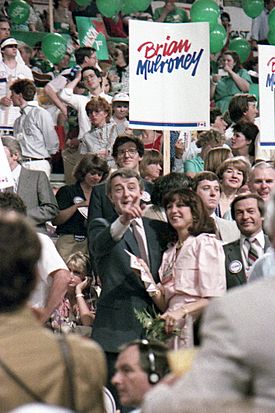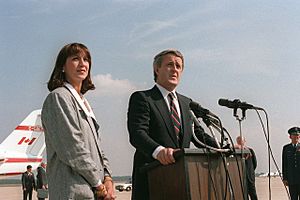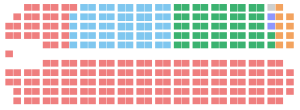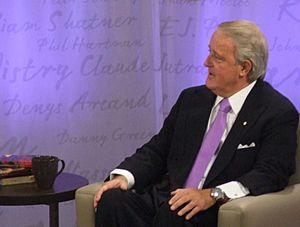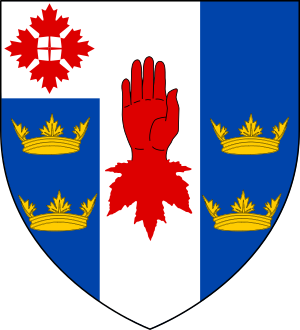Brian Mulroney facts for kids
Quick facts for kids
Brian Mulroney
|
|||||||||||||||||||||||||||||
|---|---|---|---|---|---|---|---|---|---|---|---|---|---|---|---|---|---|---|---|---|---|---|---|---|---|---|---|---|---|
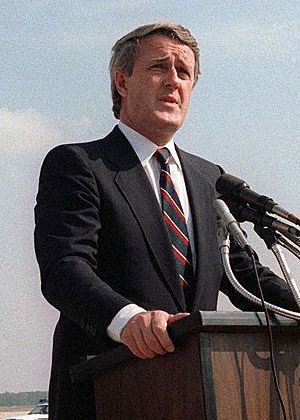
Mulroney in 1984
|
|||||||||||||||||||||||||||||
| 18th Prime Minister of Canada | |||||||||||||||||||||||||||||
| In office September 17, 1984 – June 25, 1993 |
|||||||||||||||||||||||||||||
| Monarch | Elizabeth II | ||||||||||||||||||||||||||||
| Governor General | Jeanne Sauvé Ray Hnatyshyn |
||||||||||||||||||||||||||||
| Deputy | Erik Nielsen Don Mazankowski |
||||||||||||||||||||||||||||
| Preceded by | John Turner | ||||||||||||||||||||||||||||
| Succeeded by | Kim Campbell | ||||||||||||||||||||||||||||
| Leader of the Opposition | |||||||||||||||||||||||||||||
| In office August 29, 1983 – September 17, 1984 |
|||||||||||||||||||||||||||||
| Preceded by | Erik Nielsen | ||||||||||||||||||||||||||||
| Succeeded by | John Turner | ||||||||||||||||||||||||||||
| Leader of the Progressive Conservative Party | |||||||||||||||||||||||||||||
| In office June 11, 1983 – June 13, 1993 |
|||||||||||||||||||||||||||||
| Preceded by | Erik Nielsen (interim) | ||||||||||||||||||||||||||||
| Succeeded by | Kim Campbell | ||||||||||||||||||||||||||||
|
|||||||||||||||||||||||||||||
| Personal details | |||||||||||||||||||||||||||||
| Born |
Martin Brian Mulroney
March 20, 1939 Baie-Comeau, Quebec, Canada |
||||||||||||||||||||||||||||
| Died | February 29, 2024 (aged 84) Palm Beach, Florida, U.S. |
||||||||||||||||||||||||||||
| Political party | Progressive Conservative (before 2003) | ||||||||||||||||||||||||||||
| Other political affiliations |
Conservative (after 2003) | ||||||||||||||||||||||||||||
| Spouse |
Mila Pivnički
(m. 1973) |
||||||||||||||||||||||||||||
| Children | 4, including Caroline and Ben | ||||||||||||||||||||||||||||
| Relatives | Jessica Mulroney (daughter-in-law) | ||||||||||||||||||||||||||||
| Education | St. Francis Xavier University (BA) Dalhousie University (no degree) Laval University (LLB) |
||||||||||||||||||||||||||||
| Signature | |||||||||||||||||||||||||||||
Brian Mulroney (March 20, 1939 – February 29, 2024) was a Canadian lawyer, businessman, and politician. He served as the 18th prime minister of Canada from 1984 to 1993. Born in Baie-Comeau, Quebec, he studied political science and law. He became a well-known labour lawyer in Montreal.
After trying for the leadership of the Progressive Conservative Party in 1976, he became president of the Iron Ore Company of Canada in 1977. In 1983, he successfully became the leader of the Progressive Conservatives. He then led the party to a huge win in the 1984 federal election. His party won the second-highest percentage of seats in Canadian history. He won a second majority government in 1988.
As prime minister, Mulroney brought in big economic changes. These included the Canada–United States Free Trade Agreement and the Goods and Services Tax (GST). He also sold off many government-owned companies like Air Canada. Mulroney tried to get Quebec to agree to changes to the Canadian Constitution. He proposed the Meech Lake Accord and then the Charlottetown Accord. Both plans aimed to recognize Quebec as a distinct society and give more power to provinces. However, both agreements failed. This led to a rise in Quebec separatism and the creation of the Bloc Québécois political party.
In foreign policy, Mulroney made Canada's relationship with the United States stronger. He also strongly opposed apartheid (racial segregation) in South Africa. He led efforts within the Commonwealth to put sanctions on South Africa. Mulroney also focused on protecting the environment. He made a treaty with the U.S. on acid rain and added new national parks. Canada was also the first industrialized country to agree to the Convention on Biological Diversity.
The GST was very unpopular, and the Canadian economy faced a recession in the early 1990s. The failure of the Charlottetown Accord and growing unhappiness in Western Canada also hurt Mulroney's popularity. He resigned in June 1993 and handed power to Kim Campbell. In the election later that year, the Progressive Conservatives lost almost all their seats. After leaving politics, Mulroney worked as an international business consultant. He also served on the boards of many companies.
Contents
- Early Life (1939–1955)
- Family
- Education (1955–1964)
- Labour Lawyer (1964–1976)
- Business Leadership (1976–1983)
- Opposition Leader (1983–1984)
- Prime Minister (1984–1993)
- After Politics (1993–2024)
- Legacy
- Supreme Court Appointments
- Honours
- Coat of Arms
- Images for kids
- See also
Early Life (1939–1955)
Brian Mulroney was born on March 20, 1939, in Baie-Comeau, Quebec. This was a small, isolated town in eastern Quebec. His parents, Mary Irene and Benedict Martin Mulroney, were Irish Canadian Catholics. His father worked as a paper mill electrician.
Because there was no English-language Catholic high school in Baie-Comeau, Brian went to a Catholic boarding school in Chatham, New Brunswick. His father worked extra jobs to pay for his children's education. He encouraged Brian, his oldest son, to go to university.
Mulroney often shared stories about newspaper publisher Robert R. McCormick. McCormick's company had founded Baie-Comeau. Mulroney would sing Irish songs for McCormick, who would give him $50. Mulroney grew up speaking both English and French very well.
Family
On May 26, 1973, Mulroney married Mila Pivnički. She was the daughter of a Serbian-Canadian doctor. Many of his campaign buttons showed both his face and Mila's. People said Mila would help him win more votes than he would himself.
The Mulroneys have four children: Caroline, Benedict (Ben), Mark, and Nicolas. His daughter, Caroline, is a politician in Ontario. She is currently Ontario's minister of transportation. His son, Ben, was a TV host for many years. Ben is married to stylist Jessica. Their three children were page boys and bridesmaids at the wedding of Prince Harry and Meghan Markle in 2018. Mark and Nicolas both work in finance in Toronto.
Education (1955–1964)
Mulroney started at St. Francis Xavier University in the fall of 1955 when he was 16. He joined the campus Progressive Conservative group early on. There, he made important and lasting friendships. He also became close friends with Lowell Murray, who later became his mentor.
Mulroney loved political organizing. He helped the local PC candidate win a surprise victory in the 1956 Nova Scotia election. He also attended the 1956 leadership convention in Ottawa. He was impressed by John Diefenbaker and joined the "Youth for Diefenbaker" committee. Diefenbaker won the leadership, and Mulroney became friends with him.
Mulroney was a great public speaker and debater at St. Francis Xavier University. He never lost an inter-university debate. He was also very active in campus politics. He served as campus prime minister in a Maritimes-wide Model Parliament in 1958.
After getting a degree in political science in 1959, Mulroney went to Dalhousie Law School in Halifax. He also became friends with Nova Scotia Premier Robert Stanfield. Mulroney helped Stanfield win re-election in 1960. However, Mulroney got sick and left Dalhousie after his first year. He then went to Université Laval in Quebec City in 1960 to continue his law studies.
In Quebec City, Mulroney made many friends who would later be important in Canadian politics. He also became friends with future Quebec Premier Daniel Johnson Sr. Mulroney spent the summer of 1962 working in Ottawa for the Minister of Agriculture, Alvin Hamilton. This gave him valuable experience in political campaigns.
Labour Lawyer (1964–1976)
After graduating from Laval in 1964, Mulroney joined a large law firm in Montreal. He became a labour lawyer in 1965. He was known for helping to end several strikes. One notable success was ending a difficult strike at the Montreal newspaper La Presse. This helped him become friends with the paper's owner, Paul Desmarais. Mulroney became a partner at his law firm in 1971.
A big moment for Mulroney was during the Cliche Commission in 1974. This commission looked into problems at the James Bay Project, a huge hydroelectric project in Quebec. Mulroney was asked to join the commission. The hearings were widely covered by the media and made Mulroney well known in Quebec. The commission found that organized crime had influenced unions. Mulroney's work on this commission boosted his public profile.
1976 Progressive Conservative Leadership Election
After the Progressive Conservatives lost the 1974 election, their leader, Robert Stanfield, resigned. Mulroney decided to run for the leadership, even though he had never been elected to office. He spent a lot of money on his campaign, more than other candidates. This earned him the nickname 'Cadillac candidate'.
At the 1976 leadership convention, Mulroney came in second on the first vote. However, his expensive campaign and lack of experience in Parliament did not win over enough delegates. He was eventually beaten by Joe Clark on the second vote.
Business Leadership (1976–1983)
After the leadership race, Mulroney became an executive at the Iron Ore Company of Canada (IOC). In 1977, he became the company's president. He improved relations with workers, and the company's profits grew. In 1983, he successfully closed the Schefferville mine, getting a good deal for the workers affected. During his time at IOC, Mulroney kept building his network of political and business contacts across Canada.
Opposition Leader (1983–1984)
Joe Clark had led the Progressive Conservatives to a minority government in 1979, but they lost the next election in 1980. By late 1982, many in the party questioned Clark's leadership. Mulroney, while publicly supporting Clark, worked behind the scenes to challenge him.
When Clark received only 66.9% support from delegates at a party meeting in January 1983, he resigned. He then ran to regain his position at the 1983 leadership convention. Mulroney ran against him again, but this time he campaigned smarter. He had been criticized for not having enough policy ideas in 1976. So, he gave several important speeches in the early 1980s, which were published in a book called Where I Stand.
Mulroney was elected party leader on June 11, 1983. He beat Clark on the fourth vote, gaining support from many parts of the party, especially from Quebec. Two months later, Mulroney became a Member of Parliament (MP) for Central Nova in Nova Scotia. He won a special election after another MP stepped aside for him.
Mulroney spoke both English and French very well. This, along with his roots in Quebec, gave him a big advantage throughout his political career.
By early 1984, the Progressive Conservatives were far ahead in opinion polls. It seemed clear that the Liberals, led by Prime Minister Pierre Trudeau, would lose the next election. Trudeau announced his retirement in February 1984. John Turner, his former finance minister, became the new Liberal leader and prime minister in June.
Turner called a general election for September 1984. During a televised debate, Turner tried to attack Mulroney over political appointments. But Mulroney turned the tables by pointing out many controversial appointments made by the Liberals. He famously asked Turner, "You had an option, sir—you could have said 'no'". This exchange is seen as a key moment that helped Mulroney win.
On September 4, 1984, Mulroney and the Progressive Conservatives won a huge victory. They took 211 seats, the most ever won by any party in Canadian history. They also won over half of the popular vote and led in every province. This was the first time since 1958 that the Tories became a truly national party. Their success in Quebec was especially important. The Tories had only won one seat in Quebec in 1980, but they won 58 seats in 1984. Mulroney then ran and won in the Quebec riding of Manicouagan, which included his hometown.
Prime Minister (1984–1993)
Mulroney's victory was the first Conservative majority in 26 years. He had a strong position to lead Canada. However, his support came from different groups with different interests. These included social conservatives from Western Canada, Quebec nationalists, and financial conservatives from Ontario and Atlantic Canada. It was hard to keep all these groups happy.
Many of Mulroney's ministers were new to government. This sometimes led to conflicts and embarrassing situations. Many Tories also expected political appointments after being out of power for so long.
Economic Policy
Social Programs and Spending
When he was Opposition leader, Mulroney called social programs a "sacred trust." But once in office, his government started to reduce spending on them. They gradually reduced benefits for old age security for middle and higher incomes. They also cut spending for unemployment insurance (UI) and reduced the number of workers covered.
In 1990, Mulroney's government stopped its financial contribution to UI. This meant that workers and employers covered all UI costs. They also limited payments for the "baby bonus" to only lower-income Canadians.
Mulroney's government also reduced the number of federal employees. They transferred some costs of universal health care and higher education to the provinces. This meant some provinces had to cut insurance coverage for certain medical procedures. The government also stopped subsidies for government-owned train and postal services. This led to some post offices closing and some train routes being cut.
Deficit
One of Mulroney's main goals was to lower the government deficit. This deficit had grown significantly under previous governments. By 1988, his government had cut the deficit. However, it later increased again, partly due to a worldwide recession in the early 1990s.
Mulroney's inability to improve government finances, along with tax increases, upset some of his supporters. The Bank of Canada also raised interest rates, which made the recession worse in Canada.
| Budget | 1985 | 1986 | 1987 | 1988 | 1989 | 1990 | 1991 | 1992 | 1993 |
|---|---|---|---|---|---|---|---|---|---|
| Deficit | $33.389 | $29.842 | $29.017 | $27.947 | $29.143 | $33.899 | $32.319 | $39.019 | $38.5 |
Taxation
Mulroney's government made changes to taxes. They increased taxes on alcohol, tobacco, and gasoline. In 1988, they lowered the tax on corporate income.
In August 1989, Mulroney's government announced the Goods and Services Tax (GST). This was a nine percent national sales tax. It was meant to replace an older, hidden sales tax. The government said the GST would make Canada's economy more competitive. The GST did not apply to basic groceries or health care. After public complaints, the tax rate was lowered to seven percent.
The GST was very unpopular. Many Canadians opposed it. Two Progressive Conservative MPs even left the party because of it. The Senate, which had a Liberal majority, refused to pass the GST bill. Mulroney used a special part of the Constitution to ask the Queen to appoint eight new Senators. This gave the Tories a majority in the Senate. In December 1990, the GST was passed and became law on January 1, 1991. Mulroney's use of this "emergency" clause was controversial and made him less popular.
Privatizations
Mulroney's government sold off many government-owned companies, called crown corporations. Out of 61 crown corporations in 1984, his government sold 23 of them. This included Air Canada, which was fully privatized by 1989. They also sold Petro-Canada in 1991.
Energy Policy
In 1985, Mulroney's government made an agreement with oil-producing provinces. This agreement allowed oil prices to be set by the market, not by the government. This ended the National Energy Program, which had been very unpopular in Western Canada.
Environmental Policy
Protecting the environment was a key focus for Mulroney's government. They created eight new national parks, including Bruce Peninsula and South Moresby. They also passed important laws like the Canadian Environmental Assessment Act and the Canadian Environmental Protection Act.
In 1987, Mulroney hosted a global climate conference in Montreal, Quebec. There, 46 countries signed the Montreal Protocol. This agreement aimed to limit the use of chemicals called chlorofluorocarbons (CFCs), which were harming the ozone layer.
Mulroney also worked with U.S. President George H. W. Bush to create the U.S.–Canada Air Quality Agreement in 1991. This treaty aimed to reduce acid rain by cutting air pollution. Canada was also the first industrialized country to agree to the 1992 Convention on Biological Diversity at the Earth Summit in Rio de Janeiro, Brazil.
In 1992, Mulroney's government put a ban on cod fishing off the coast of Newfoundland and Labrador. This was because the number of cod had dropped dramatically due to overfishing. This ban led to many job losses, and the government provided support programs for the affected workers.
Social Policy
On September 22, 1988, Mulroney officially apologized on behalf of the Canadian government for the Japanese Canadian internment during World War II. His government also provided money as compensation to the survivors and the Japanese community.
Mulroney also set up the Deschênes Commission to investigate Nazi war criminals in Canada. This was a sensitive issue in some communities.
Attempted Constitutional Reform
Meech Lake Accord
One of Mulroney's biggest goals was to solve the issue of national unity. In 1981, Quebec had not agreed to the changes that brought the Constitution of Canada to Canada. Mulroney wanted Quebec to formally endorse the Constitution.
In 1987, Mulroney negotiated the Meech Lake Accord with the ten provincial premiers. This agreement aimed to recognize Quebec as a "distinct society" within Canada. It also gave more powers to the provinces. For the Accord to become law, it needed to be approved by the federal Parliament and all ten provincial legislatures within three years.
Many Canadians supported the Accord, hoping it would reduce Quebec separatism. However, some critics in English Canada worried that the "distinct society" clause would give Quebec special status. As criticism grew, support for the Accord outside Quebec declined.
Lucien Bouchard, Mulroney's environment minister, resigned from the government because he felt the Accord was being betrayed. He later helped form the Bloc Québécois, a party that supports Quebec independence.
By June 1990, all premiers agreed to ratify the Accord, but two provinces, Manitoba and Newfoundland and Labrador, had not yet approved it. Elijah Harper, a Member of the Legislative Assembly in Manitoba, opposed the Accord because Indigenous groups had not been consulted. His opposition prevented the Accord from passing in Manitoba. As a result, the Meech Lake Accord failed to become law by the deadline of June 23, 1990.
Charlottetown Accord
After the failure of Meech Lake, Mulroney tried again to get Quebec's agreement on the Constitution. His government held many discussions and conferences across the country. Unlike the Meech Lake Accord, Indigenous peoples were included in these talks.
These discussions led to the Charlottetown Accord, which was announced in Charlottetown, Prince Edward Island, in August 1992. The Accord gave provinces more control over areas like forestry and mining. It also addressed Indigenous self-government and included a "Canada Clause" that defined Canadian values. It also proposed changes to the Senate of Canada and the House of Commons.
The Accord was supported by the federal government and all ten provincial governments. Mulroney's government decided to hold a national referendum to get public approval. On October 26, 1992, Canadians voted on the Charlottetown Accord. Nationally, 54.3% opposed it. In Quebec, 56.7% opposed it. Many people saw the Accord's defeat as a protest against Mulroney's government, which was very unpopular at the time.
Foreign Policy
As prime minister, Mulroney improved Canada's relationship with the United States. He became close friends with U.S. President Ronald Reagan. In March 1985, they held the "Shamrock Summit" in Quebec City. This meeting showed the strong friendship between the two leaders.
The Air India Flight 182 bombing happened on June 23, 1985. This was a major terrorist act, and most of the 329 victims were Canadian citizens. There were questions about why warnings about terrorist threats were not taken more seriously.
In November 1984, Mulroney sent Canada's ambassador to the United Nations to push for action against the famine in Ethiopia. Canada played a big role in helping Ethiopia, contributing over 10% of international aid.
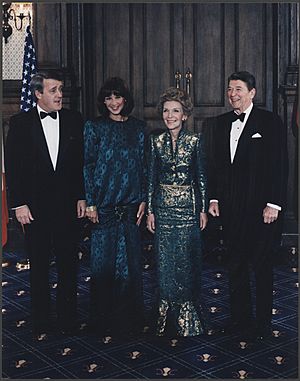
On December 2, 1991, Canada was the first Western nation to recognize Ukraine as an independent country. This happened the day after Ukraine voted for independence.
Apartheid
Mulroney's government strongly opposed the apartheid system in South Africa. Starting in 1985, Mulroney led efforts within the Commonwealth to put sanctions on South Africa. The goal was to pressure them to end apartheid and release Nelson Mandela from prison. This put Mulroney at odds with British Prime Minister Margaret Thatcher and U.S. President Ronald Reagan, who both opposed sanctions.
After a meeting in August 1986, Canada and other Commonwealth nations put 11 new sanctions on South Africa. These included bans on new air travel, new investments, and imports of South African goods.
The day after Nelson Mandela was released from prison on February 11, 1990, he spoke with Mulroney. Mandela thanked him for his efforts to end apartheid. Mandela later made the Parliament of Canada the first legislature in the world he visited for a speech. On June 18, 1990, Mandela spoke in the House of Commons of Canada, thanking Mulroney and Canadians.
Free Trade and 1988 Re-election
Negotiations between Canada and the United States for a free trade treaty began in May 1986. In October 1987, a deal was reached: the Canada–United States Free Trade Agreement (CUSFTA). This agreement said that all tariffs (taxes on imported goods) between the two countries would be removed by 1998. Mulroney's close relationship with U.S. President Ronald Reagan helped achieve this deal.
The agreement was controversial. While Mulroney used his large majority in the House of Commons to pass the bill, the Liberal-controlled Senate demanded an election before voting on it. This led Mulroney to call an election for November 21, 1988.
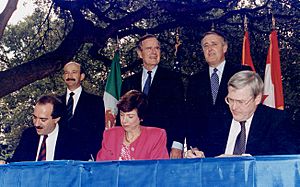
The trade deal was the main issue of the election. The Liberals and the New Democratic Party (NDP) opposed it. Liberal leader John Turner believed the agreement would make Canada too much like the U.S. and cost many Canadian jobs. After a debate, the Liberals were ahead in the polls. To fight this, the Progressive Conservatives ran a more negative campaign. They focused on public doubts about Turner's leadership.
The Progressive Conservatives' poll numbers improved, and they were re-elected with a smaller majority. They won 169 out of 295 seats. Mulroney became the first and only federal Canadian Conservative leader since John A. Macdonald to lead his party to a second majority government. The trade deal was supported by Quebec Premier Robert Bourassa, which helped the PCs keep their support in Quebec. In this election, Mulroney ran and won in another eastern Quebec seat, Charlevoix.
The CUSFTA deal became law on January 1, 1989. In 1994, it was replaced by the North American Free Trade Agreement (NAFTA), which also included Mexico.
Gulf War
In the early 1990s, Mulroney played a key role in stopping Saddam Hussein's invasion of Kuwait. Canada supported the armed United Nations coalition during the 1991 Gulf War. Canada sent planes, support staff, and a field hospital. This was the first time since 1974 that Canadian forces were directly involved in combat operations.
Unpopularity and Retirement
Fracturing of Electoral Coalition
In late 1987, the Reform Party of Canada was founded in Western Canada. This party was created because Western Canadians were unhappy with Mulroney's government. They opposed his efforts at constitutional reform and the new GST. Although the Reform Party won few seats at first, it showed that Mulroney's support in the West was weakening.
In June 1991, the Bloc Québécois was founded by Lucien Bouchard, Mulroney's former environment minister. This party supported Quebec independence. Its creation was due to the failure of the Meech Lake Accord. The Bloc Québécois attracted some MPs from the Progressive Conservatives and Liberals.
Resignation
Public anger over the GST, the early 1990s recession, and the failure of his constitutional reforms caused Mulroney's popularity to drop sharply. By 1992, his approval ratings were very low, making him one of the most unpopular prime ministers in Canadian history.
On February 24, 1993, Mulroney announced he would resign as prime minister and leave politics. On June 13, 1993, Kim Campbell, his defence minister, replaced him as leader of the Progressive Conservatives. Mulroney resigned as prime minister on June 25, 1993.
Aftermath
In the October 25, 1993 election, the Progressive Conservative Party suffered a huge defeat. They went from 156 seats to just two. This was the worst defeat ever for a governing party in Canada. The Tories were no longer recognized as an official party in the House of Commons.
The more right-wing Reform Party gained support from unhappy Western Canadians. They became the main conservative party in Canada, winning 52 seats. The Bloc Québécois took over Mulroney's support in Quebec. They became the Official Opposition with 54 seats. The Liberals, led by Jean Chrétien, won a strong majority government.
The Progressive Conservative Party later merged with the Canadian Alliance (Reform's successor) in 2003. This created today's Conservative Party of Canada.
After Politics (1993–2024)
After leaving office, Mulroney worked as an international business consultant. He also served on the boards of many companies.
In 1998, Mulroney received Canada's highest civilian honour. He was made a Companion of the Order of Canada.
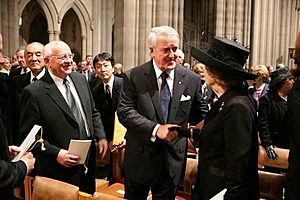
In 2003, Mulroney received the Woodrow Wilson Award for Public Service. This award recognized his career in politics. In June 2004, Mulroney gave a speech at the state funeral of former U.S. President Ronald Reagan. He and former British Prime Minister Margaret Thatcher were the first foreign leaders to speak at an American president's funeral.
In 2014, Mulroney became the chairman of Quebecor, a large Canadian media company. On December 5, 2018, Mulroney also gave a speech at the state funeral of former U.S. President George H. W. Bush.
Public Inquiry
After leaving office, Mulroney faced a public inquiry regarding payments he received from a German-Canadian businessman. The inquiry looked into whether these payments were connected to government contracts. Mulroney denied any wrongdoing. In 2010, the Oliphant Commission reported that Mulroney had accepted $225,000. The report stated that Mulroney "failed to live up to the standard of conduct" he had set. It also said his acceptance of cash was an attempt to hide the transactions.
Conservative Party of Canada
Mulroney supported the merger of the Canadian Alliance and the Progressive Conservatives. He joined the new Conservative Party of Canada when it was created in 2003. This was different from other former PC politicians who did not join the new party.
In 2015, Mulroney supported Prime Minister Stephen Harper in the federal election. In 2021, he campaigned for Conservative Leader Erin O'Toole. He later urged the new Conservative leader, Pierre Poilievre, to move closer to the political middle.
Other Political Interventions
In 2003, Mulroney criticized the Liberal government's foreign policy. He said he wanted Canada to stick with its "old friends and allies" like the United States. He also supported the Iraq War.
In June 2023, Mulroney praised Liberal Prime Minister Justin Trudeau for his handling of the United States–Mexico–Canada Agreement (USMCA) trade deal and the COVID-19 pandemic. He also criticized former U.S. President Donald Trump.
Memoir
Mulroney's book, Memoirs: 1939–1993, was released on September 10, 2007. In the book, Mulroney shared his thoughts on his life and career.
Death
On February 29, 2024, Brian Mulroney passed away at a hospital in Palm Beach, Florida. He had been hospitalized after a fall at his home.
Legacy
Brian Mulroney's time as prime minister is seen as complex. He believed his economic and free trade policies, which were once considered very new, were proven right because later governments did not reverse them. His deputy prime minister, Don Mazankowski, said Mulroney's greatest achievement was "dragging Canada kicking and screaming into the 21st century." His legacy is often linked to the 1989 Free Trade Agreement and the Goods and Services Tax (GST). Mulroney argued that his government's economic policies helped the next government reduce the national debt.
At the time of his resignation, Mulroney was very unpopular. This led many Conservative politicians to distance themselves from him for some years. In the 1993 election, the Progressive Conservative Party was almost completely wiped out. This was partly due to public anger against Mulroney and the splitting of his political support. The Reform Party gained support in Western Canada, and the Bloc Québécois gained support in Quebec.
In 2006, Mulroney was named the "greenest" Prime Minister in Canadian history by a panel of experts. Military historians Norman Hillmer and J. L. Granatstein ranked Mulroney eighth out of 20 Canadian prime ministers in their 1999 book.
In 2019, St. Francis Xavier University in Nova Scotia opened the Brian Mulroney Institute of Government. This is a large initiative to teach students about public policy and governance.
Supreme Court Appointments
Mulroney chose the following judges to be appointed to the Supreme Court of Canada:
- Gérard La Forest (January 16, 1985 – September 30, 1997)
- Claire L'Heureux-Dubé (April 15, 1987 – July 1, 2002)
- John Sopinka (May 24, 1988 – November 24, 1997)
- Charles Gonthier (February 1, 1989 – August 1, 2003)
- Peter Cory (February 1, 1989 – June 1, 1999)
- Beverley McLachlin (March 30, 1989 – December 15, 2017; later became Chief Justice)
- William Stevenson (September 17, 1990 – June 5, 1992)
- Frank Iacobucci (January 7, 1991 – June 30, 2004)
- John C. Major (November 13, 1992 – December 25, 2005)
Mulroney also advised the appointment of Antonio Lamer as Chief Justice in 1990.
Honours
As a former Prime Minister, he was called "The Right Honourable" for life.
| Ribbon | Description | Notes | Ref |
| Grand Cross of the National Order of Honour and Merit (Haiti) |
|
||
| Companion of the Order of Canada (C.C.) |
|
||
| Grand Officer of the Ordre national du Québec |
|
||
| 125th Anniversary of the Confederation of Canada Medal |
|
||
| Queen Elizabeth II Golden Jubilee Medal for Canada |
|
||
| Queen Elizabeth II Diamond Jubilee Medal for Canada |
|
||
| Grand Cross with Collar of the Order of Kniaz Yaroslav the Wise (Ukraine) |
|
||
| Grand Cordon of the Order of the Rising Sun (Japan) |
|
||
| Supreme Companion of O. R. Tambo (Gold) (South Africa) |
|
||
| Commander of the National Order of the Legion of Honour (France) |
|
Honorary Degrees
Brian Mulroney received several honorary degrees from universities:
| Location | Date | School | Degree |
|---|---|---|---|
| October 1980 | Memorial University of Newfoundland | Doctor of Laws (LL.D) | |
| May 21, 1992 | Johns Hopkins University | Doctor of Humane Letters (DHL) | |
| April 26, 1994 | Central Connecticut State University | Doctor of Social Science (D.S.Sc) | |
| 1994 | Tel Aviv University | Honorary Doctor of Philosophy | |
| May 1998 | University of Missouri–St. Louis | Doctor of Laws(LL.D) | |
| December 2005 | Concordia University | Doctor of Laws (LL.D) | |
| May 21, 2007 | Boston College | Doctor of Laws (LL.D) | |
| June 15, 2007 | University of Western Ontario | Doctor of Laws (LL.D) | |
| June 16, 2007 | Université Laval | ||
| June 3, 2016 | Université de Montréal | Unspecified Doctorate (PhD) | |
| June 6, 2017 | McGill University | Doctor of Laws | |
| May 15, 2018 | St. Thomas University | Unspecified Doctorate | |
| Ontario | June 25, 2021 | Ontario Tech University | Doctor of Laws |
Other Awards
In 2018, Mulroney was inducted into the Canadian Disability Hall of Fame. He also received the George Bush Award for Excellence in Public Service.
Coat of Arms
Images for kids
See also
 In Spanish: Brian Mulroney para niños
In Spanish: Brian Mulroney para niños
- List of prime ministers of Canada
- Mulroney: The Opera
- Shamrock Summit
 | James Van Der Zee |
 | Alma Thomas |
 | Ellis Wilson |
 | Margaret Taylor-Burroughs |


